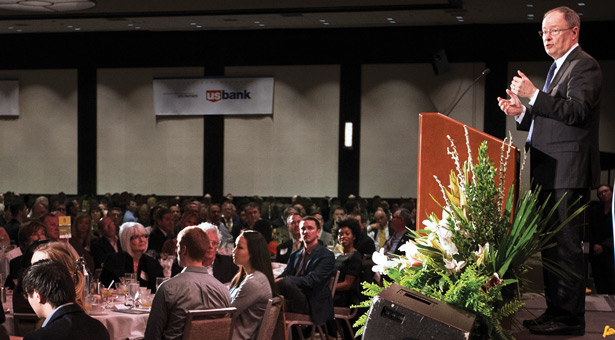The City Urban Perspectives
Stopping Hackers In Their Tracks
Former NSA Director Says Government-Civilian Cooperation Key to Cybersecurity
By Clint Kelly (ckelly@spu.edu) | Photo by Mike Siegel
 Former NSA director Keith Alexander spoke
at SPU's Downtown Business Breakfast
held at Seattle's Westin Hotel.
Former NSA director Keith Alexander spoke
at SPU's Downtown Business Breakfast
held at Seattle's Westin Hotel.
Defending the federal government, the nation’s economy, and the personal information of millions of American citizens from cyberattack is an enormous undertaking. As director of the National Security Agency and commander of the U.S. Cyber Command, General Keith Alexander shouldered significant responsibility for the nation’s security from 2005 to 2014.
On April 10, 2015, he spoke of life at the epicenter of counterterrorism and his admiration for Seattle Pacific University’s emphasis on individual character and vision of “engaging the culture, changing the world.”
The occasion was the University’s 19th annual Downtown Business Breakfast, where before an audience of approximately 1,000 business, civic, and government leaders, Alexander explored “Espionage, Cybersecurity, and Privacy.” In the audience were such security dignitaries as four-star General Barry McCaffrey, who is a member of the Army Ranger Hall of Fame, and Seattle Police Chief Kathleen O’Toole, along with members of her senior leadership team.
“If everybody in industry and in government is getting hacked, our strategy’s not working.”
“The rate of technical change doubles every two years,” said Alexander. “The top in-demand jobs in 2013–14 didn’t exist in 2004 ... That’s the challenge in the university environment today. So it gets you back to some basics: faith, values, and a real solid education background that can adapt to that change.”
In terms of cybersecurity, the expert in electronic warfare said there needs to be a new approach. “If everybody in industry and in government is getting hacked, our strategy’s not working.”
He believes in government and industry collaborating to solve security breaches and build better safeguards to protect the nation’s technology systems. He wants to better secure technology perimeters so that cybercriminals cannot gain entry. Once inside computer systems, he said, “bad guys” are difficult to detect. “The normal time that an adversary is in the network before he is detected is between 205 and 220 days.”
Now retired from government service and CEO of his own private cybersecurity firm, Alexander says that in 2007 he and his NSA team were able to significantly reduce American troop casualties in Iraq and Afghanistan. They did so by cutting the time it took to get intelligence data to the battlefield from 16 hours to one minute. Both military and civilians put themselves in harm’s way to help set up the improved system and Alexander said the cooperation made him “tremendously proud.” “Over the next year, that system helped us capture and kill about 40,000 bad guys and it broke the back of the resistance.”
In a question and answer period following his address, Alexander counted it a great privilege to have served in the U.S. military and intelligence communities. While only intending to be in the Army for five years, he served 40. Of the controversy surrounding national security and privacy rights, launched by the NSA documents leaked by Edward Snowden, he said, “I would rather take the heat than risk human life.”
Read an exclusive interview with Alexander.
